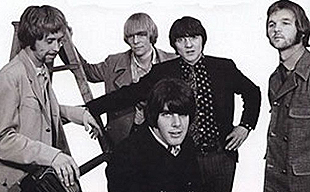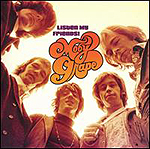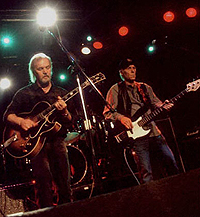 Moby Grape
Moby Grape
'Listen, My Friends!'
Amongst music fans it is generally considered that the place to be in 1967 was San Francisco. Just as Liverpool had been the focus of the scene in 1963, and Seattle would be the musical epicentre in 1990; in ’67 it was San Francisco that attracted the most creative young musicians of the era.
One of the great bands to come out of the Bay area was Moby Grape, and for four decades they have enjoyed a legendary status amongst critics, cognoscenti and fellow musicians. And now a brand new anthology has been released, Listen, My Friends: The Best of Moby Grape [Columbia/Legacy] a 20-song overview from their four highly-prized Columbia albums from 1967-’69; including two rare tracks, one of them previously unissued. The package includes an introduction by David Fricke of Rolling Stone and a 1,200-word liner notes essay by Santa Clara-based writer Jud Cost.
The Moby Grape story began in 1966, when 21-year old Beverly Hills brat packer Peter Lewis met bassist Bob Mosley, formerly of San Diego band The Misfits. They relocated to the Bay Area to form a band with Skip Spence, recently departed from the drum stool with Jefferson Airplane and eager to return to guitar. Mosley knew drummer Don Stevenson from SF band The Frantics, whose line-up included Jerry Miller. The band’s three-guitar, four-vocal frontline set them apart, as did their original two and three minute songs, tempered by stretched-out jams that fused country blues, pop and R&B.
Columbia’s SF-based A&R staff producer David Rubinson liked what he heard when he saw them at the Ark club in Sausalito, signed them at the beginning of 1967, and produced their first three albums. The self-titled debut, (#121 on Rolling Stone’s Top 500 albums) nearly sunk the band when Columbia over hyped it by issuing five singles, simultaneously.
Like many bands of that era, Moby Grape were plagued by internal problems, including the well documented breakdown of Skip Spence, and indescribably complicated business and personal issues. Despite all that, the remaining members of the band were due to be touring again this summer. Last week I spoke to founder member Jerry Miller about the CD and asked whether the proposed Moby Grape tour was still going ahead:
“I don’t know, I have no idea, I kinda doubt it right now. I’m going out with my band [The Jerry Miller Band] but the Grape need to get together and do some serious rehearsals: we all live in different places and it’s sometimes difficult to get together and put the time in.”
Tell me about the other member’s of the band? How are they doing?
“Well, Don [Stevenson - drums] is up in Canada and he’s doing fine. Bob [Mosley – bass] is in California, Peter [Lewis – guitar] is in Solvang [a Danish community, just north of Santa Barbara in Southern California]. We also have the late Skip Spence’s son in the band, Omaha Spence, and he lives in San Jose. Everybody’s pretty good and in good health.”

You’ve had a few ‘best of’ compilations over the years, how do you feel about this re-issue? What makes it different? "It’s a much better mix and much better quality. The lushness of the sound is much better than previous ‘best of’ albums we’ve had out in the past. It was always difficult in the old San Francisco days to get a decent sound on your recordings. The equipment these days is so much better. I wasn’t personally involved in the re-mastering; it was done by Bob Irwin in New York.”
I see that you have ‘thanked’ Robert Plant in the liner notes, any reason?
“Well, he’s a good friend. Every time he comes over here we have to get together a little bit. He was very helpful to Skip Spence and he’s always been a fan of the band. When Led Zeppelin first started rehearsing they played a couple of Moby Grape songs. We’ve always stayed in touch.”
The first Moby Grape album contained some perfect pop songs. Looking back, do you feel that you weren’t given enough credit for that record?
“The whole album was a real gem as far as I’m concerned. There was a real theme to it; I could play it over and over again. Maybe at first we didn’t get enough credit and that’s when you really want to hit it."
It is well documented that Columbia over-hyped the album, do you agree? Do you remember your reaction when told they were going to release five singles simultaneously? "It was pretty foolish. If they’d put out one single they could have bombarded the airwaves with it, I think that would have made more sense. My reaction to hearing the news was ‘wow, that’s different’; it might have been a good idea if it had worked. None of the singles cracked the charts nationally, only on the coasts and in Chicago did they sell well."
Do you know that there is film of Moby Grape on YouTube? "Yes I do. I have a copy of the Mike Douglas show that we were on. There is also a track on YouTube of us called ‘The Belle of New Baghdad’."
Is it true that you played on Bobby Fuller’s “I Fought the Law”? How did that come about? “I did that on the El Paso version on the Eastwood label. That was a long time ago. I was just about to graduate from high school and I knew the drummer from Bobby Fuller’s band and he said they were looking for a guitar player. So we jumped on a Five Star Eagle and headed down to El Paso., which is were Bobby lived. I’d never felt anything so hot in my life then when we stopped at Yuma in Arizona. Later I went back there with Moby Grape and played the Celebrity Theatre in Phoenix.”

Does the Jerry Miller Band play any of the old Moby Grape songs, after all, you wrote a lot of the material? “Yes, I do. I play; ‘Murder in the Heart’, ‘Can’t Be So Sad’, ‘8:05’, ‘Hey Grandma’. People often ask for them and sometimes even if I’m not too hot on it I’ll always give it a go.”
Can I ask you about the song ‘Can’t Be So Bad’, who is singing lead? Whose idea was the brass section? How long did it take to work out the harmonies? "Don Stevenson is singing lead, he co-wrote the song with me. The idea of the brass section was mine. I sat with those guys and I hummed my ideas for the brass parts and the arranger sat with me and wrote it all down on a chart. Strangely it didn’t take long to do the harmonies. Don’s harmony with me was a parallel on a third and sometimes a fifth. Pete was a good harmony singer and just fitted his on real quickly without much discussion. So, in the studio it all went pretty easily. I wrote that song with Don in our hotel room in New York the day before we recorded it. What I think is so amazing about that recording is that Don plays the most amazing shuffle drum part.”
Lastly, can you tell me what happened to that lovely big Gibson L5 you used to play in Moby Grape? "I’ve still got it, that’s my baby; I play it all the time. I’ve had it for 46 years. I had it made for me in 1961. In those days you would trace out your hand on a piece of paper and send it in to Gibson at Kalamazoo and they made a guitar specifically for you. It cost $650 which was a lot of money in those days. I had to sell my ’55 Chevy to get it but then I became a full-time musician and that’s what I’ve been doing ever since.”
Interviewed by Peter 'Tab' Walker
Find out more about the Jerry Miller Band at the following website:
www.jerrymillerband.com
Back To Archives

